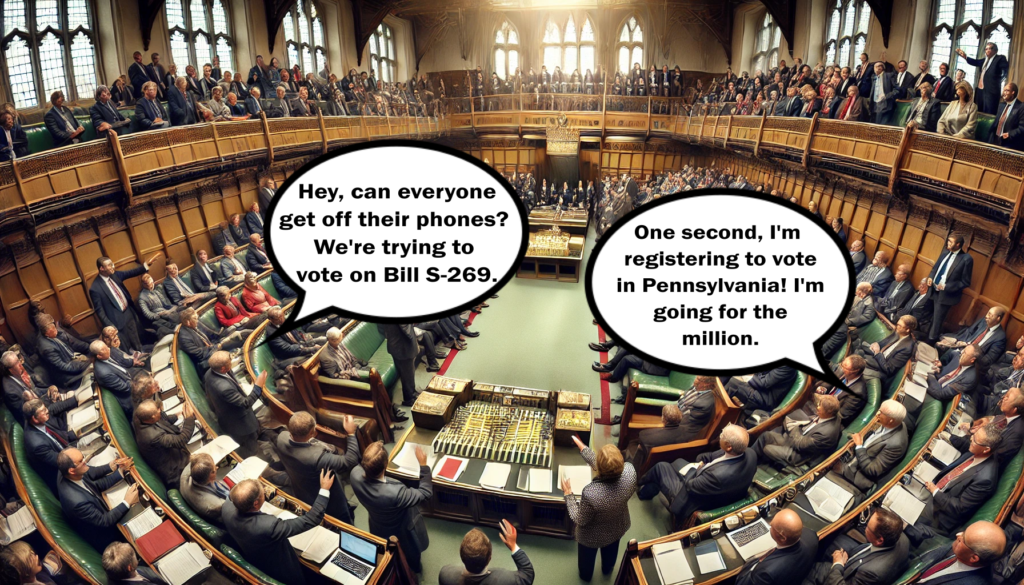In this week’s edition of the GME3, we’re taking a look at a critical update to Entain’s position in Canada’s igaming market, a new update on the status of Bill S-269 (which aims to regulate sports betting advertisements nationwide), and news regarding Elon Musk’s $1 million-per-day voter “lottery” in Pennsylvania. Read on for the full stories!
Gambling
Entain Out of the Betting Pool
Entain, an international sports betting and gambling company, has recently had its position in the Canadian igaming market called into question after the Mohawk Council of Kahnawà:ke (MCK) cancelled its exclusive partnership for its Sports Interaction brand.
In a statement from the MCK, it was announced that their igaming branch, Mohawk Online, had ended the arrangement with Entain-owned Avid International, the company that supplied Sports Interaction. Among the factors contributing to this move, the MCK named:
Changes to Canada’s regulatory landscape;
The launch of Ontario’s regulated igaming market; and,
The desire for the MCK to seek “other opportunities in online gaming, under a new brand” required them to first be released from this exclusive contract.
Sports Interaction was operated by Mohawk Online and licensed through the Kahnawà:ke Gaming Commission (KGC). The rights to do so are based on Kahnawà:ke’s Aboriginal right to conduct and manage gaming, which has recently come into question in light of the Ontario government’s own claim over the right to “conduct and manage” igaming in the province.
This move calls the future of Avid into question, as the company has now lost its only client. Entertain purchased Avid in 2022 to secure the relationship with the MCK, but now that the relationship has ended, Avid no longer serves a purpose. The MCK has said it will maintain a “cordial” relationship with Entain and that the latter will keep its back office from the Mohawk Territory of Kahnawà:ke. Licenses granted through the KGC will also continue to be maintained.
While Entain will likely retain the rights to the Sports Interaction site and the player base, we’ll have to wait and see if they find a way to keep it running in the Great White North.
Media
House Rules for Betting Ads
Bill S-269, a proposed federal law aiming to regulate sports betting advertisements nationwide, recently passed in the Senate and is moving to the House of Commons for further review. This bill responds to a surge in sports betting ads following the 2021 legalization of sports betting under Bill C-218, which led to significant growth in Ontario’s online betting market, impacting other provinces as well.
Senator Marty Deacon, who introduced the bill, clarified that it doesn’t propose a complete ban on gambling ads but rather mandates the Minister of Canadian Heritage to create a national framework for regulating these ads. This framework would focus on establishing limits for ad frequency, content, and placement, while potentially restricting celebrity endorsements.
Additionally, Bill S-269 seeks to promote research on the impact of gambling ads – especially on minors – and aims to set national standards for addressing gambling-related harms. If the bill passes successfully through the House of Commons, the Canadian Radio-television and Telecommunications Commission (CRTC) would also need to reassess its policies on sports betting ads.
The Transport and Communications Committee, which held extensive hearings with mental health professionals, broadcasters, and industry experts, highlighted concerns about the impact of these ads on young and vulnerable audiences. Broadcasters and betting firms reported they’re already taking steps to reduce ad volume. Some major sports organizations, like the NFL and NHL, cautioned against overly restrictive measures, urging lawmakers to consider a balanced approach. The bill’s passage in the House of Commons would lead to further review, potential amendments, and, if approved by both chambers, royal assent to become law.
Entertainment
Finding X-tra Votes?
A Pennsylvania judge recently ruled that Elon Musk’s $1 million-per-day voter giveaway, organized by his political action committee (PAC), America PAC, can continue, despite concerns that it may be an illegal lottery. This decision comes just a day before the presidential election. The giveaway, which has already distributed $16 million to voters in battleground states, requires participants to sign a petition supporting free speech and gun rights to enter. During the case, Judge Angelo Foglietta dismissed Philadelphia District Attorney Larry Krasner’s attempt to halt the daily payouts, though he stated he would release a detailed opinion later.
Prosecutors argued that the giveaway was misleading, suggesting that winners were selected not randomly, as advertised, but based on their potential to promote the PAC’s pro-Trump message. Chris Young, the PAC’s director, testified that winners were chosen through a review of their social media and videos, with non-disclosure agreements preventing them from discussing the selection process. Young admitted surprise at Musk’s characterization of the contest as “random,” contradicting the PAC’s selection method.
Musk’s lawyer, Andy Taylor, defended the campaign as supporting free speech and gun rights, alleging Krasner was infringing on Pennsylvanians’ rights. The U.S. Department of Justice has reportedly cautioned Musk’s PAC over potential legal violations, but no federal actions have been taken. Musk, a vocal Trump supporter, has contributed nearly $120 million to the PAC’s efforts.
While the American government may not be pursuing action against Musk, participants in the fraudulent lottery have now launched a class action suit. Filed by Arizona resident Jacqueline McAferty in the Austin, Texas federal court, the suit alleges that Musk and his America PAC organization falsely induced voters to sign by claiming winners would be chosen randomly. Additionally, the suit continues to claim that the defendants profited from the giveaway by driving traffic to X (Musk’s social media platform) and collecting personal information such as names, addresses, and phone numbers that they could sell. The class is seeking at least $5 million in damages.
GME Law is Jack Tadman, Zack Pearlstein, Lindsay Anderson, Daniel Trujillo, and Will Sarwer-Foner Androsoff. Jack’s practice has focused exclusively on gaming law since he was an articling student in 2010, acting for the usual players in the gaming and quasi-gaming space. Zack joined Jack in September 2022. In addition to collaborating with Jack, and with a keen interest in privacy law, Zack brings a practice focused on issues unique to social media, influencer marketing, and video gaming. Lindsay is the most recent addition to the team, bringing her experience as a negotiator and contracts attorney, specializing in commercial technology, SaaS services, and data privacy.
At our firm, we are enthusiastic about aiding players in the gaming space, including sports leagues, media companies, advertisers, and more. Our specialized knowledge in these industries allows us to provide tailored solutions to our clients’ unique legal needs. Reach out to us HERE or contact Jack directly at jack@gmelawyers.com if you want to learn more!
Check out some of our previous editions of the GME3 HERE and HERE, and be sure to follow us on LinkedIn to be notified of new posts, keep up to date with industry news, and more!




